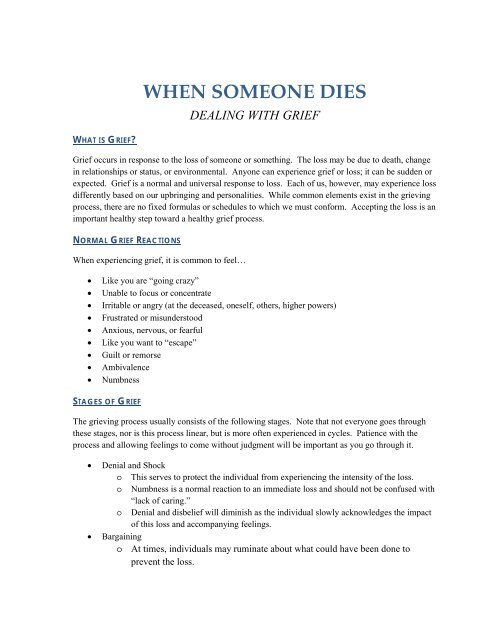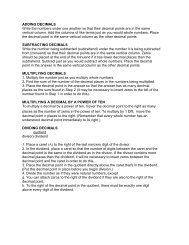When Someone Dies - Dealing with Grief
When Someone Dies - Dealing with Grief
When Someone Dies - Dealing with Grief
Create successful ePaper yourself
Turn your PDF publications into a flip-book with our unique Google optimized e-Paper software.
WHEN SOMEONE DIES<br />
DEALING WITH GRIEF<br />
WHAT IS GRIEF<br />
<strong>Grief</strong> occurs in response to the loss of someone or something. The loss may be due to death, change<br />
in relationships or status, or environmental. Anyone can experience grief or loss; it can be sudden or<br />
expected. <strong>Grief</strong> is a normal and universal response to loss. Each of us, however, may experience loss<br />
differently based on our upbringing and personalities. While common elements exist in the grieving<br />
process, there are no fixed formulas or schedules to which we must conform. Accepting the loss is an<br />
important healthy step toward a healthy grief process.<br />
NORMAL GRIEF REACTIONS<br />
<strong>When</strong> experiencing grief, it is common to feel…<br />
<br />
<br />
<br />
<br />
<br />
<br />
<br />
<br />
<br />
Like you are “going crazy”<br />
Unable to focus or concentrate<br />
Irritable or angry (at the deceased, oneself, others, higher powers)<br />
Frustrated or misunderstood<br />
Anxious, nervous, or fearful<br />
Like you want to “escape”<br />
Guilt or remorse<br />
Ambivalence<br />
Numbness<br />
STAGES OF GRIEF<br />
The grieving process usually consists of the following stages. Note that not everyone goes through<br />
these stages, nor is this process linear, but is more often experienced in cycles. Patience <strong>with</strong> the<br />
process and allowing feelings to come <strong>with</strong>out judgment will be important as you go through it.<br />
<br />
<br />
Denial and Shock<br />
o This serves to protect the individual from experiencing the intensity of the loss.<br />
o Numbness is a normal reaction to an immediate loss and should not be confused <strong>with</strong><br />
“lack of caring.”<br />
o Denial and disbelief will diminish as the individual slowly acknowledges the impact<br />
of this loss and accompanying feelings.<br />
Bargaining<br />
o At times, individuals may ruminate about what could have been done to<br />
prevent the loss.
o Individuals can become preoccupied about ways that things could have been better,<br />
imaging all the things that will never be.<br />
o This reaction can provide insight into the impact of the loss; however, if not properly<br />
resolved, intense feelings of remorse or guilt may hinder the healing process.<br />
Depression<br />
o After recognizing the true extent of the loss, some individuals may experience<br />
depressive symptoms.<br />
o Sleep and appetite disturbance, lack of energy and concentration, and crying spells<br />
are some typical symptoms.<br />
o Feelings of loneliness, emptiness, isolation and self-pity can also surface during this<br />
phase, contributing to this reactive depression.<br />
o For many, this phase must be experienced in order to begin reorganizing one’s life.<br />
Anger<br />
o This reaction usually occurs when an individual feels helpless and powerless.<br />
o Anger may result from feeling abandoned, occurring in cases of loss through death.<br />
o Feelings of resentment may occur toward one’s higher power or toward life in<br />
general for the injustice of this loss.<br />
o After an individual acknowledges anger, guilt may surface due to expressing these<br />
negative feelings.<br />
o Again, these feelings are natural and should be honored to resolve the grief.<br />
Acceptance<br />
o Acceptance does not mean happiness. Instead you accept and deal <strong>with</strong> the reality of<br />
the situation.<br />
o Time allows the individual an opportunity to resolve the range of feelings that<br />
surface.<br />
o Individuals may return to some of the earlier feelings throughout one’s lifetime.<br />
o There is no time limit to the grieving process. Each individual should define one’s<br />
own healing process.<br />
FACTORS THAT MAY HINDER THE HEALING PROCESS:<br />
<br />
<br />
<br />
Avoidance or minimization of one’s emotions.<br />
Use of alcohol or drugs to self-medicate<br />
Use of work (overfunction at workplace) to avoid feelings.<br />
WAYS TO COPE WITH DEATH AND DYING<br />
<br />
<br />
<br />
<br />
<br />
<br />
Allow time to experience thoughts and feelings openly to self.<br />
Acknowledge and accept all feelings, both positive and negative.<br />
Use a journal to document the healing process.<br />
Confide in a trusted individual; tell the story of the loss.<br />
Express feelings openly. Crying offers a release.<br />
If your religious convictions are important to you, talk to a member of the clergy about your<br />
beliefs and thoughts.
Join a support group.<br />
Take good care of yourself. Eat well-balanced meals. Get plenty of rest.<br />
Be patient <strong>with</strong> yourself. It takes time to heal. Some days will be better than others.<br />
If the healing process becomes too overwhelming, seek professional help.<br />
BEING HELPFUL TO ANOTHER DURING A TIME OF GRIEF<br />
<br />
<br />
<br />
<br />
<br />
<br />
<br />
<br />
<br />
Communicate your concern for the other person<br />
…initiate conversation, listen, and be willing to talk about the loss<br />
Be available. Avoid using the pharse “I know just how you feel.”<br />
…Let the person know that you are available, if needed<br />
Be supportive but do not attempt to “make them feel better”<br />
…It is important that the individual is be allowed to “feel” whatever feelings arise<br />
Avoid making judgments about how a person should be feeling during their grief<br />
…People express their thoughts and emotions in a variety of ways<br />
Acknowledge the difficulties in having easy answers to the hard questions about life<br />
…Affirm the appropriateness of questions and encourage conversation<br />
Remember the importance of anniversaries, celebrations, and activities<br />
…Be sensitive to the memories special occasions and activities hold for the person<br />
Reaffirm the value of your relationship<br />
…Be mindful of the importance in various types of relationships<br />
Be sensitive to the cyclic nature of the grief process<br />
…Be patient. Remember that grief can appear to come and go for no apparent reason<br />
If symptoms of depression are very severe or persistent and the grieving individual is not<br />
coping <strong>with</strong> day to day activities, encourage that individual to get professional help.<br />
RECOMMENDED READING<br />
<br />
<br />
<br />
Death, The Final Stage of Growth. Englewood Cliffs, NJ: Prentice Hall, 1975 Kubler-Ross,<br />
Elisabeth.<br />
On Death and Dying. New York: MacMillan, 1969 Kubler-Ross, Elisabeth.<br />
<strong>When</strong> Bad Things Happen to Good People. New York: Schocken Books, 1981 Kushner, H.S.<br />
WHERE TO TURN FOR HELP<br />
‣ Counseling Services<br />
Lake Washington Technical College<br />
To make an appointment to see a counselor, call 425-739-8300 or visit West Building,<br />
Room 207<br />
‣ 2-1-1 (Community Resource Line)<br />
You can call this information line to find out about support groups in your community, lowcost<br />
counseling centers, and many other resources.<br />
Created by Counseling Services at LWTC

















